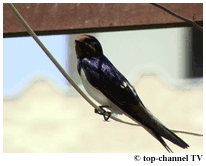|
Select the statements that apply to the video segment.
|
|
Listen carefully to the following phrases:
- dallëndyshet bënin folenë
- në shtëpinë tonë
- mendoi të ma vinte emrin
- prejardhjen e emrit tim
|
|
true
|
Dallendyshja was named after the bird that her grandmother liked.
|
This statement is correct.
This information is at the beginning of the video segment. There is background music that can make hearing it clearly somewhat difficult; however, if you listen closely to Dallëndyshja, you can hear what she says very clearly.
The following is what Dallandyshja said:
Gjyshja ime, meqë vinin kaq shumë dallëndyshe në pranverë, dhe mendoi të ma vinte emrin Dallëndyshe.
Grammar Note:
Gjyshja ime (my grandmother)
- gjyshja (grandmother) is the subject of the sentence, is a n., fem., nom., def. form. sing. The plural form is gjyshet (grandmothers).
- ime (my) is a pronominal adjective feminine gender, and the masculine gender is im (my). Note: The pronominal adjectives characteristically indicate to whom something or someone belongs. Example: oborri im (my yard).
- mendoi (she thought) v., simple past, third person, singular, and it refers to the subject gjyshja (grandmother). The infinitive form is për të menduar (to think). As you have probably noted, in Albanian, the personal pronoun is often omitted. However, the meaning is understood from the verb (e.g., first, second or third person, singular or plural).
The following is a translation of what Dallendyshe said:
Seeing that many swallows in the spring, my grandmother thought to name me "Dallendyshe," alias "Swallow."
|
al_soc225_act2_feed1.mp3
|
|
|
Swallows nests were damaged at Dallendyshja's house.
|
This statement is incorrect.
Dallandyshja does mention that swallows built their nests at her home but does not say that the swallows' nests were damaged.
The Dallendyshja said the following:
Dallëndyshet bënin folenë në shtëpinë tonë, d.m.th. meqë ishte një shtëpi private, dhe aty vinin shumë dallëndyshe.
Grammar Note:
Dallëndyshet bënin folenë
- Dallëndyshet (Swallows) is the subject of the sentence; it is a n., nom., plu., fem., def.
- bënin (made) is a verb and it refers to the subject dallëndyshet. The infinite form is për të bërë (to make).
folenë (nest) is the direct object; it is a n., fem., sing., accu. case,. It interesting to see the use of word fole in different contexts.
- fole e fishekut (cartridge chamber)
- fole merimange (spiderweb; cobweb)
- fole pëllumbash (pigeon loft)
- fole e predhës (projective chamber)
d.m.th.abbreviation = domethënë (that is, in other words, i.e.)
The following is a translation of the statement:
Swallows were nesting in our house, in our home, and there were many swallows to be seen there.
|
al_soc225_act2_feed2.mp3
|
|
true
|
The speaker is happy about her name because it relates to this migratory bird.
|
This statement is correct.
This idea is what Dallendyshja conveys in the last part of this video segment. There is still background music; listen carefully again.
The following is what Dallendyshja says:
Meqë, unë kam lindur në stinën e pranverës edhe unë isha e lumtur që kisha prejardhjen e emrit tim nga zogjtë që vinin në pranverë, shtegtarë.
Grammar Note:
- unë kam lindur (I was born) v., 1st per., sing., present perfect tense. lindur is the participle of the verb lind (to give birth).
- prejardhjen (origin) is a compound noun. It is formed from the prep., prej (from)+ part., ardh (to come) + suffix jen.
- shtegtar (migratory) adjective, it modifies the noun zogjtë.
The following is a translation of the above-mentioned statement:
Since, I was born in the spring I am happy that my name does originate from a bird migrating in the spring.
|
al_soc225_act2_feed3.mp3
|
|
![]() after you finish this activity.
after you finish this activity.![]() pasi të mbaroni këtë ushtrim.
pasi të mbaroni këtë ushtrim.